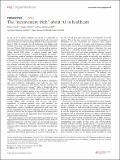| dc.contributor.author | Panch, Trishan | |
| dc.contributor.author | Mattie, Heather | |
| dc.contributor.author | Celi, Leo Anthony G. | |
| dc.date.accessioned | 2020-06-05T15:07:34Z | |
| dc.date.available | 2020-06-05T15:07:34Z | |
| dc.date.issued | 2019-08-16 | |
| dc.identifier.issn | 2398-6352 | |
| dc.identifier.uri | https://hdl.handle.net/1721.1/125684 | |
| dc.description.abstract | As the UK sits in painful deadlock over Brexit, it is important to remember that governments are regularly faced with crises, and their responses can create enduring benefit for future generations. Back in 1858, for example, the UK parliament was dealing with another messy crisis: “the great stink.” In a world before sanitation, the river Thames had become an open latrine, and as summer blossomed parliament was engulfed in a pestilential stench. £2.5 million (about £300 million in today’s money) was hastily approved to build a network of sewers throughout the capital.1 This particular model of sanitation, developed by Bazalgette, was adopted by other cities around the world and the rest, as they say, is history. It is now unthinkable that a developed nation would not have sanitation infrastructure. However, back in 1858 the debate was whether sanitation infrastructure was worthy of investment and whether it was a public or private good. A similar debate has been simmering for some time regarding health data infrastructure, defined as the hardware and software to securely aggregate, store, process and transmit healthcare data. Is data infrastructure necessary for healthcare organizations and if so, is it the responsibility of individual healthcare organizations, of local health systems, or is it a public good? [First paragraph] | en_US |
| dc.description.sponsorship | National Institute of Health NIBIB (grant no. R01 EV017205) | en_US |
| dc.publisher | Springer Science and Business Media LLC | en_US |
| dc.relation.isversionof | 10.1038/s41746-019-0155-4 | en_US |
| dc.rights | Creative Commons Attribution 4.0 International license | en_US |
| dc.rights.uri | https://creativecommons.org/licenses/by/4.0/ | en_US |
| dc.source | Nature | en_US |
| dc.title | The "inconvenient truth" about AI in healthcare | en_US |
| dc.type | Article | en_US |
| dc.identifier.citation | Panch, Trishan, Heather Mattie, and Leo Anthony Celi, "The 'inconvenient truth' about AI in healthcare." npj Digital Medicine 2, 1 (Aug. 2019): no. 77 doi 10.1038/s41746-019-0155-4 ©2019 Author(s) | en_US |
| dc.contributor.department | Massachusetts Institute of Technology. Institute for Medical Engineering & Science | en_US |
| dc.relation.journal | npj Digital Medicine | en_US |
| dc.eprint.version | Final published version | en_US |
| dc.type.uri | http://purl.org/eprint/type/JournalArticle | en_US |
| eprint.status | http://purl.org/eprint/status/PeerReviewed | en_US |
| dspace.date.submission | 2019-12-10T14:21:40Z | |
| mit.journal.volume | 2 | en_US |
| mit.journal.issue | 1 | en_US |
| mit.metadata.status | Complete | |
